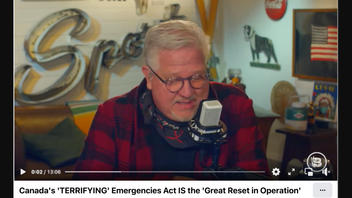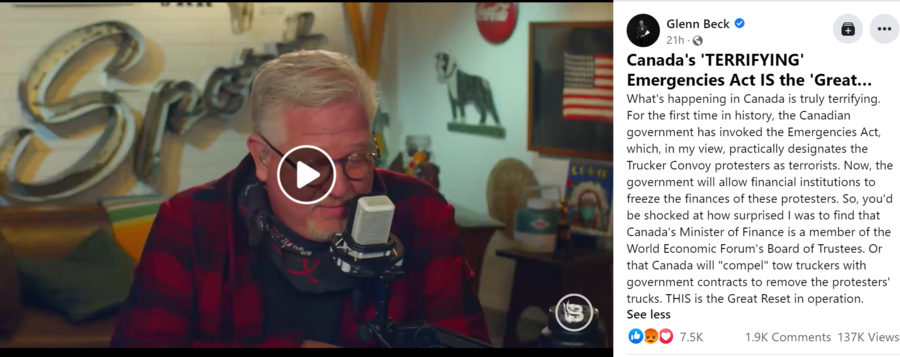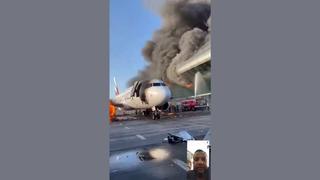
Did Canada invoke its Emergencies Act for the first time ever? Yes, that's true, but Canada has had a similar law in place since Parliament adopted the War Measures Act in August 1914, shortly after the beginning of World War I. The War Measures Act was last used by then-Prime Minister Pierre Elliott Trudeau in 1970 during the October Crisis, which involved growing violence with Quebec separatists. The War Measures Act was repealed and replaced by the more limited Emergencies Act in 1988.
The claim appeared in a video posted to Facebook (archived here) by conservative political commentator Glenn Beck on February 15, 2022, under the title "Canada's 'TERRIFYING' Emergencies Act IS the 'Great..." It opened:
What's happening in Canada is truly terrifying. For the first time in history, the Canadian government has invoked the Emergencies Act, which, in my view, practically designates the Trucker Convoy protesters as terrorists. Now, the government will allow financial institutions to freeze the finances of these protesters. So, you'd be shocked at how surprised I was to find that Canada's Minister of Finance is a member of the World Economic Forum's Board of Trustees. Or that Canada will 'compel' tow truckers with government contracts to remove the protesters' trucks. THIS is the Great Reset in operation.
This is what the post looked like on Facebook on February 16, 2022:
(Source: Facebook screenshot taken on Wed Feb 16 15:48:27 2022 UTC)
Beck is correct in saying that the Emergencies Act has never been invoked before, but its predecessor, the more sweeping War Measures Act, was invoked multiple times during the nation's history, most recently in 1970. During World War I it was in place from August 1914 to January 1920. The War Measures Act was invoked again during WW II. During both wars, "enemy aliens" were interned on the suspicion they posed a threat to the safety of the state. The only time the War Measures Act was used in a domestic crisis was in October and November 1970, during what was known as the October Crisis, which involved a violent Quebec separatist movement.
Canadian Prime Minister Justin Trudeau invoked the Emergencies Act on February 14, 2022, in the midst of trucker-inspired protests over the country's COVID-19 health measures that have disturbed residents in Ottawa's downtown for weeks and snarled traffic flow at multiple crossings at the U.S. border. The Act gives the federal government temporary powers to handle the ongoing blockades and protests. This is how the Department of Justice Canada describes the law:
The Act contains a specific definition of "national emergency" that makes clear how serious a situation needs to be before the Act can be relied upon. A national emergency is an urgent, temporary and critical situation that seriously endangers the health and safety of Canadians or that seriously threatens the ability of the Government of Canada to preserve the sovereignty, security and territorial integrity of Canada. It must be a situation that cannot be effectively dealt with by the provinces and territories, or by any other law of Canada. There are four types of emergencies that can be declared under the Emergencies Act:
- A public welfare emergency
- A public order emergency
- An international emergency
- A war emergency
At the 2:50 mark in the video, Beck suggests something bigger and more sinister is afoot with the developments in Canada:
This is the Great Reset in operation, just being brought in under the guise of emergency powers.
"The Great Reset" is the name of a public policy initiative the World Economic Forum (WEF) launched in response to the COVID crisis. The phrase has been hijacked by conspiracy theorists who believe an evil cabal is using the pandemic as a pretext. In some versions of the theory, shadowy elites orchestrated COVID to seize power; in others, the virus just presents the opportunity for them to do so.
Like most spreading conspiracy theories, this one has its roots in something real. They can be traced to an initiative launched by the WEF in June 2020. Far from being a secret, though, the plan was announced with a fair amount of fanfare and even has a website, which can be seen here.
According to the WEF, the Great Reset agenda has three main components. The first is steering markets toward fairer outcomes. The second is ensuring investments are helping to advance shared goals, such as sustainability, and the third component is harnessing technology in support of the public good.
Beck linked the Great Reset with the Emergencies Act, citing the connection between Canada's Minister of Finance Chrystia Freeland and the WEF. She is a member of the Forum's Board of Trustees. Freeland is also Canada's deputy prime minister.
Lead Stories previously debunked the claim that the Great Reset is a secret plan masterminded by global elites to limit freedoms and push radical policies.


















